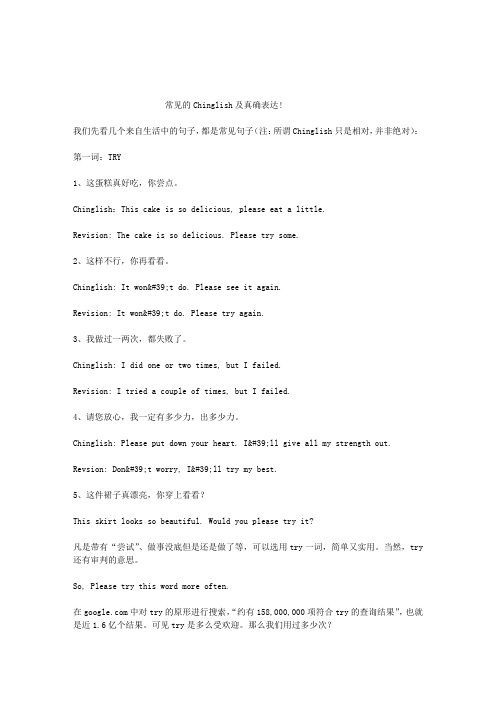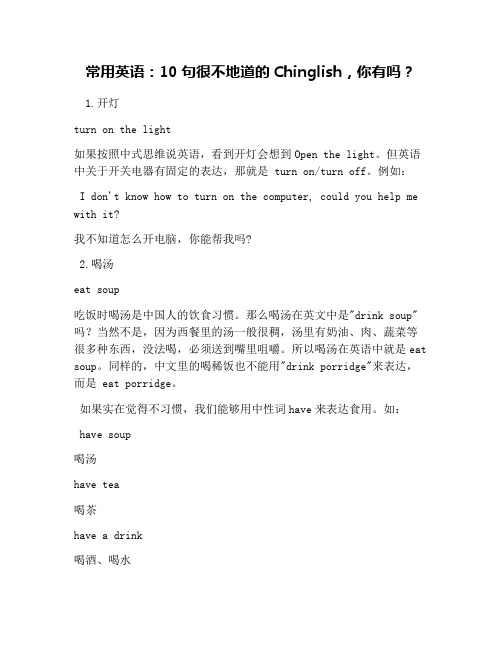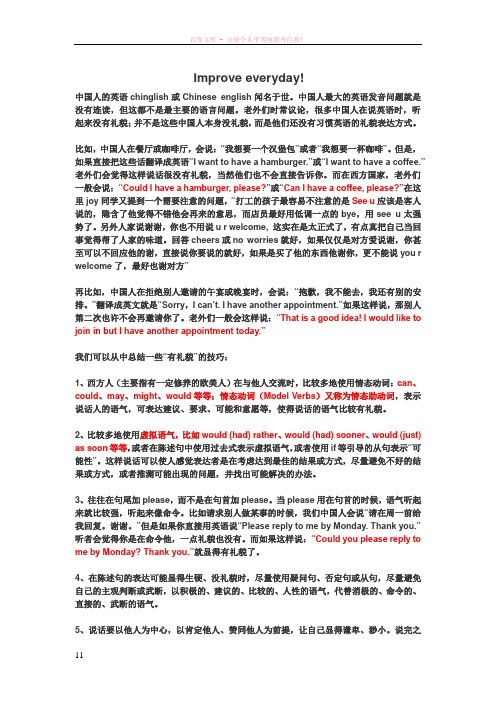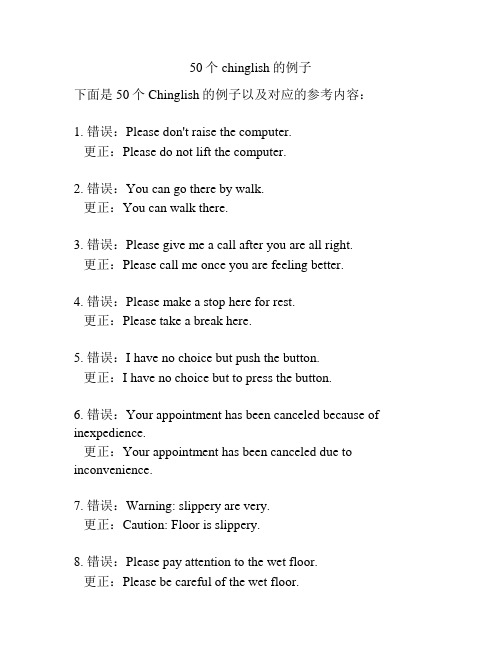英文表达中常见的Chinglish
常见的Chinglish及真确表达

常见的Chinglish及真确表达!我们先看几个来自生活中的句子,都是常见句子(注:所谓Chinglish只是相对,并非绝对):第一词:TRY1、这蛋糕真好吃,你尝点。
Chinglish:This cake is so delicious, please eat a little.Revision: The cake is so delicious. Please try some.2、这样不行,你再看看。
Chinglish: It won't do. Please see it again.Revision: It won't do. Please try again.3、我做过一两次,都失败了。
Chinglish: I did one or two times, but I failed.Revision: I tried a couple of times, but I failed.4、请您放心,我一定有多少力,出多少力。
Chinglish: Please put down your heart. I'll give all my strength out.Revsion: Don't worry, I'll try my best.5、这件裙子真漂亮,你穿上看看?This skirt looks so beautiful. Would you please try it?凡是带有“尝试”、做事没底但是还是做了等,可以选用try一词,简单又实用。
当然,try 还有审判的意思。
So, Please try this word more often.在中对try的原形进行搜索,“约有158,000,000项符合try的查询结果”,也就是近1.6亿个结果。
可见try是多么受欢迎。
那么我们用过多少次?第二词 Enjoy这一动词我印象比较深刻,它的用法比较简单,凡是带有“享受到”的意思就可以用。
中式英语 Chinglish

3. 你是做什么工作的呢? 你是做什么工作的呢? 误:What's your job? 正:Are you working at the moment? 如今西方世界失业率居高不下,西班牙的失业 率已经高达20%。 如果谈话对象刚刚失业,如此 直接的问法会让对方有失面子,所以要问: Are you working at the moment? (目前您在上班吗?)接下来才问:Where are you working these days?(目前您在哪儿工作呢?)或 者What line of work are you in? (您从事哪个行业 呢?)
5. 现在几点钟了? 现在几点钟了? 误:What time is it now? 正:What time is it, please? 或 What time is it by your watch? What’s the time by your watch? 提示:What time is it now是一个直接从 汉语翻译过的句子,讲英语的时候没有必 要说now,因为不可能问What time was it yesterday?所以符合英语习惯的说法是:请 问现在几点了?
4. 明天我有事情要做。 明天我有事情要做。 误:I will have something to do tomorrow。 正:I will be tied up all day tomorrow. 提示:用I have something to do来表示 很忙,这也完全是中国式的说法。因为每 时每刻我们都有事情要做,躺在那里睡大 觉也是事情。所以可以说我很忙,脱不开 身:I‘m tied up. 还有其它的说法: Sorry, I will be fully occupied I can't make it at that time. I'd love to, but I can't. I have to stay at home.
容易误解的一些chinglish

大家对Chinglish早已经见怪不怪了,也大张旗鼓地进入了英语标准词组的"领地".英文词句的表达往往并非是单词的真正意思,如果一不留神就会酿成"英语尴尬",闹笑话不说,表达错误有时会带来不少误会。
我们千万不要小看容易造成误会的"危险词句"--日常用语类busboy 餐馆勤杂工(不是"公汽售票员")busybody 爱管闲事的人(不是"大忙人")dead president 美钞(上印有总统头像)(并非"死了的总统")sweet water 淡水(不是"糖水")confidence man 骗子(不是"信得过的人")criminal lawyer 刑事律师(不是"犯罪的律师")rest room 厕所(不是"休息室")dressing room 化妆室(不是"试衣室"或"更衣室")horse sense 常识(不是"马的感觉")capital idea 好主意(不是"资本主义思想")black tea 红茶(不是"黑茶")black stranger 完全陌生的人(不是"陌生的黑人") white man 忠实可靠的人(不是"皮肤白的人")green hand 新手(不是"绿手")blue stocking 女学者、女才子(不是"蓝色长统袜") Chinese dragon 麒麟(不是"中国龙")American beauty 红蔷薇(不是"美国美女")Spanish athlete 吹牛的人(不是"西班牙运动员")成语类pull one's leg 开玩笑(不是"拉后腿")eat one's words 收回前言(不是"吃话")an apple of love 西红柿(不是"爱情之果")handwriting on the wall 不祥之兆(不是"大字报")bring down the house 博得全场喝彩(不是"推倒房子")think a great deal of oneself 高看或看重自己(不是"为自己想得很多") pull up one's socks 鼓起勇气(不是"提上袜子")表达类What a shame! 多可惜!真遗憾!(不是"多可耻")You don't say! 是吗!(不是"你别说")You can say that again! 说得好!(不是"你可以再说一遍")。
常用英语:10句很不地道的Chinglish,你有吗?

常用英语:10句很不地道的Chinglish,你有吗?1.开灯turn on the light如果按照中式思维说英语,看到开灯会想到Open the light。
但英语中关于开关电器有固定的表达,那就是 turn on/turn off。
例如:I don't know how to turn on the computer, could you help me with it?我不知道怎么开电脑,你能帮我吗?2.喝汤eat soup吃饭时喝汤是中国人的饮食习惯。
那么喝汤在英文中是"drink soup"吗?当然不是,因为西餐里的汤一般很稠,汤里有奶油、肉、蔬菜等很多种东西,没法喝,必须送到嘴里咀嚼。
所以喝汤在英语中就是eat soup。
同样的,中文里的喝稀饭也不能用"drink porridge"来表达,而是 eat porridge。
如果实在觉得不习惯,我们能够用中性词have来表达食用。
如:have soup喝汤have tea喝茶have a drink喝酒、喝水have a cigarette抽烟、吸烟have a candy吃糖have an apple吃个苹果have fish吃鱼3.吃药take medicine看到这里,还能认为吃药是"eat medicine"吗,因为英文中的eat,通常含有咀嚼的意味,但是我们很少会咀嚼药品,所以吃药的地道表达是take medicine。
如:A:I had a cold.B:No need to take medicine for this illness, with a couple of days of rest you'll be all right.A:我感冒了。
B:这病不用吃药,休息一两天自然会好的。
当然了,我们这里用have medicine这个中性词表达也能够。
英汉翻译中的chinglish

遵循翻译原则
准确性
在翻译过程中,确保译文准确地传达原文的意义,避 免歧义和误解。
流畅性
使译文流畅自然,符合目标语言的表达习惯,易于理 解和接受。
忠实性
保持译文对原文的忠实度,尊重原文的语境、风格和 信息,避免主观臆断和随意改动。
04 Chinglish的实例分析
直译型Chinglish实例
总结词
提高语言表达能力
词汇积累
01
扩大英语和汉语的词汇量,特别是专业术语和常用表达方式,
提高对原文的理解和对译文准确性的把握。
语法训练
02
加强语法训练,提高对句子结构的理解和组织,确保译文的流
畅性和准确性。
语言对比
03
通过对比英语和汉语的语言特点,如句法、词法、修辞等,加
深对两种语言的认识,提高翻译的准确性。
直译型Chinglish
总结词
直接将英文单词或短语翻译成中文,不考虑中文表达习惯。
详细描述
直译型Chinglish常见于初学者或对中英文化差异了解不足的译者,他们往往直接将英文单词或短语翻译成中文, 忽略了中文的表达习惯和语法规则。例如,将“Life is like a box of chocolates”翻译为“生活就像一盒巧克 力”,而不是“人生就像一盒巧克力,你永远不知道下一块是什么味道”。
特点
Chinglish通常表现为语法错误、词汇 选择不当、语义理解偏差等方面的问 题,有时还可能带有明显的中文表达 习惯和口音。
Chinglish产生的原因
中西文化差异
语言习惯不同
语言环境影响
由于中西方文化背景、思维方式、价 值观念等方面的差异,导致人们在语 言使用和表达方式上存在不同,从而 产生Chinglish。
50个chinglish的例子

50个chinglish的例子1. "我们要去公园玩儿ball。
"2. "请你帮我个忙,可以open一下电脑吗?"3. "我最近想买个新的手机,你有没有什么recommendations?"4. "你能帮我看看这个cake怎么样吗?"5. "昨天我去了一家新开的餐馆,他们的food很好吃。
"6. "今天天气很好,我们一起去外面take个walk吧。
"7. "我不太会cook,你能教我一些简单的recipes吗?"8. "这件衣服很nice,我很喜欢它的style。
"9. "我觉得我们需要一些新的furniture来装饰房间。
"10. "这双鞋虽然贵一点,但是它的quality很好。
"11. "我昨天去了一趟shopping mall,买了一些新的衣物和accessories。
"12. "我的手机坏了,我需要找个手机修理店帮我repair一下。
"13. "这个电视的画质比较清晰,我很喜欢它。
"14. "我想给我爸爸买个surprise gift,你有什么建议吗?"15. "这个书架上的书太乱了,需要整理一下。
"16. "我现在学习了一些中文单词,但是我还不太会说。
"17. "今天早上我和朋友去了一家新开的咖啡馆,他们的咖啡味道很棒。
"18. "这个电影的情节很有趣,我建议你可以去看一下。
"19. "我们要赶紧打车,不然会迟到的。
"20. "我上个星期去了一趟海滩,那里的海水很清澈。
"21. "我最近开始学习弹吉他,但是还不太熟练。
典型的chinglish (2)

Improve everyday!中国人的英语chinglish或Chinese english闻名于世。
中国人最大的英语发音问题就是没有连读,但这都不是最主要的语言问题。
老外们时常议论,很多中国人在说英语时,听起来没有礼貌;并不是这些中国人本身没礼貌,而是他们还没有习惯英语的礼貌表达方式。
比如,中国人在餐厅或咖啡厅,会说:“我想要一个汉堡包”或者“我想要一杯咖啡”。
但是,如果直接把这些话翻译成英语“I want to have a hamburger.”或“I want to have a coffee.”老外们会觉得这样说话很没有礼貌,当然他们也不会直接告诉你。
而在西方国家,老外们一般会说:“Could I have a hamburger, please?”或“Can I have a coffee, please?”在这里joy同学又提到一个需要注意的问题,“打工的孩子最容易不注意的是See u应该是客人说的,隐含了他觉得不错他会再来的意思,而店员最好用低调一点的bye,用see u太强势了。
另外人家说谢谢,你也不用说u r welcome, 这实在是太正式了,有点真把自己当回事觉得帮了人家的味道。
回答cheers或no worries就好,如果仅仅是对方爱说谢,你甚至可以不回应他的谢,直接说你要说的就好,如果是买了他的东西他谢你,更不能说you r welcome了,最好也谢对方”再比如,中国人在拒绝别人邀请的午宴或晚宴时,会说:“抱歉,我不能去,我还有别的安排。
”翻译成英文就是“Sorry,I can’t. I have another appointment.”如果这样说,那别人第二次也许不会再邀请你了。
老外们一般会这样说:“That is a good idea! I would like to join in but I have another appointment today.”我们可以从中总结一些“有礼貌”的技巧:1、西方人(主要指有一定修养的欧美人)在与他人交流时,比较多地使用情态动词:can、could、may、might、would等等;情态动词(Model Verbs)又称为情态助动词,表示说话人的语气,可表达建议、要求、可能和意愿等,使得说话的语气比较有礼貌。
50个chinglish的例子

50个chinglish的例子下面是50个Chinglish的例子以及对应的参考内容:1. 错误:Please don't raise the computer.更正:Please do not lift the computer.2. 错误:You can go there by walk.更正:You can walk there.3. 错误:Please give me a call after you are all right.更正:Please call me once you are feeling better.4. 错误:Please make a stop here for rest.更正:Please take a break here.5. 错误:I have no choice but push the button.更正:I have no choice but to press the button.6. 错误:Your appointment has been canceled because of inexpedience.更正:Your appointment has been canceled due to inconvenience.7. 错误:Warning: slippery are very.更正:Caution: Floor is slippery.8. 错误:Please pay attention to the wet floor.更正:Please be careful of the wet floor.9. 错误:Welcome to our hotel. And we hope you will sleep well. 更正:Welcome to our hotel. We hope you have a comfortable stay.10. 错误:I go to work by subway once one day.更正:I take the subway to work every day.11. 错误:The hotel has free wife.更正:The hotel has free Wi-Fi.12. 错误:Please read carefully before you sign the document.更正:Please read the document carefully before signing.13. 错误:You should keep the safety in mind when you travel. 更正:Please keep safety in mind while traveling.14. 错误:Please press the button twice to close the door.更正:Please press the button twice to close the door.15. 错误:The event was held in a high degree of perfection.更正:The event was executed with great precision.16. 错误:Please make sure to take off your coat before entering. 更正:Please remember to take off your coat before entering.17. 错误:This shop sells a wide variety of electronic things.更正:This shop sells a wide variety of electronics.18. 错误:Please keep your eye on your belongings.更正:Please keep an eye on your belongings.19. 错误:Please put up the cautionary electrical fence.更正:Please put up the electric fence as a cautionary measure.20. 错误:Please be aware that falling ice are dangerous.更正:Please be aware that falling ice is dangerous.21. 错误:There is a meeting will be held tomorrow.更正:There will be a meeting tomorrow.22. 错误:The director invites all the staff to a dinner party.更正:The director invites all the staff to a banquet.23. 错误:In China, people eat with chopsticks in every meal.更正:In China, people use chopsticks for every meal.24. 错误:We would like to express our sincere apologize for any inconvenience caused.更正:We would like to express our sincere apologies for any inconvenience caused.25. 错误:Please be kindly to passengers with disabilities.更正:Please be kind to passengers with disabilities.26. 错误:We apologize for any disaster caused.更正:We apologize for any inconvenience caused.27. 错误:Your flight is already keep on hold.更正:Your flight is already on hold.28. 错误:Please remember to bring along your identification cards.更正:Please remember to bring your identification cards.29. 错误:The food in this restaurant tastes very delicacy.更正:The food in this restaurant is very delicious.30. 错误:Please be careful when you cross the bridge.更正:Please exercise caution when crossing the bridge.31. 错误:I'm sorry, but the restroom is under clean now.更正:I'm sorry, but the restroom is currently being cleaned.32. 错误:Please take care of your personal stufs.更正:Please take care of your personal belongings.33. 错误:Would you like to have a cup of warm water?更正:Would you like a cup of hot water?34. 错误:I feel very much happiness to meet you.更正:I am very happy to meet you.35. 错误:Your package is on the way to delivering.更正:Your package is on its way to being delivered.36. 错误:Please keep your valuables unattended.更正:Please do not leave your valuables unattended.37. 错误:The driver will come and pick up you.更正:The driver will come and pick you up.38. 错误:Our company provides a suit of services.更正:Our company provides a variety of services.39. 错误:Please do not remember your password on a public computer.更正:Please do not save your password on a public computer.40. 错误:We appreciate that you cooperate us.更正:We appreciate your cooperation.41. 错误:Please keep silent in the library.更正:Please maintain silence in the library.42. 错误:Please take care of the fire when cooking.更正:Please be cautious with fire when cooking.43. 错误:Please dispose your trash inside the bin.更正:Please dispose of your trash inside the bin.44. 错误:Please pay attention that the elevator is under repair.更正:Please be aware that the elevator is under repair.45. 错误:Please don't make noise during the public transit.更正:Please refrain from making noise during public transit.46. 错误:Please be notice that the exhibit will be closed tomorrow.更正:Please take note that the exhibit will be closed tomorrow.47. 错误:Please excuse me for my no familiar behavior.更正:Please excuse my unfamiliar behavior.48. 错误:Please take off your shoes when you enter the house.更正:Please remove your shoes when you enter the house.49. 错误:Please don't walk on the street.更正:Please do not walk in the street.50. 错误:Please dial the number again after clear up.更正:Please redial the number after hanging up.这些例子展示了Chinglish中常见的错误用法以及如何进行修正。
- 1、下载文档前请自行甄别文档内容的完整性,平台不提供额外的编辑、内容补充、找答案等附加服务。
- 2、"仅部分预览"的文档,不可在线预览部分如存在完整性等问题,可反馈申请退款(可完整预览的文档不适用该条件!)。
- 3、如文档侵犯您的权益,请联系客服反馈,我们会尽快为您处理(人工客服工作时间:9:00-18:30)。
外教一对一
英文表达中常见的「Chinglish」
出一道题:“望子成龙”用英文怎么表达?
这是一个经常出现在汉英翻译中的成语,也是很多同学在口语考试或海外生活中用到的表达。
很多人的答案(通常不假思索地)
是: …hope(s) that his/her/my/your son will become a dragon.
这个句子乍一看,语法结构、词汇的搭配貌似并没有违背语言规则。
不过如果你真的将它对着老外说出来,试图表达你的好意的时候,你的愿望估计就泡汤了。
此时老外的表情估摸着是:因为这就是一句地地道道的Chinglish!这样的表达在我们的生活中无处不在——它们
看似正确,符合语言架构的规律,但表达出来的实际意思却和初衷千差万别,给我们的交流带来了无数的困扰。
在「Chinglish」系列中,我们将会给大家层层展现生活中各方面“中式英语”的案例,教会大家正确的说法。
首先,让我们先一起来了解下——Challenge: 常见的文化现象的表达差异
A. 家长们都望子成龙。
Chinglish: Parents hope that their sons will become dragons.
Correct: Parents hope that their sons will have bright future.
在西方的文化中,dragon所代表的是邪恶、凶残的负面形象。
这个大家可以参照多数的英文电影。
这个Chinglish的交流意义无疑是
可怕的(群魔乱舞)。
那么正确的版本其实可以很简单,只需将其意思——bright future——表达清楚就可以了!
B. 你可真幸运!
Chinglish: You are such a lucky person!
Correct: You are such a lucky dog!
第二个介绍的形象就是我们的狗狗。
狗狗是人类最好的朋友,在西方人眼里尤为如此。
与中文中很多表达(如狐朋狗友、狗仗人势等)
完全相反,dog一词在英文中常伴随着很多褒义的表达,例如“every dog has its day(每个人在他或她的生命中都有一段快乐的日子)”
或“work like a dog(拼命地工作)”等。
C. 她是她爸爸的掌上明珠。
Chinglish: She is the pearl on her father’s palm.
Correct: She is the apple of her father’s eye.
此处,Chinglish的表达版本基本上采用了一个在英文中不存在的中文直译,而忽略了英文本身固有的说法——the apple of one’s eye. 它源于圣经《旧约》,apple表示人的瞳孔。
此习惯表达一直沿用至今。
D. 考满分对他来说是小菜一碟。
外教一对一
Chinglish: It’s a small plate of dish for him to get full marks.
Correct: It’s a piece of cake for him to get full marks
这个相信很多同学都明白,英文中习惯用“一小块蛋糕”来表示事情的简单。
同义的地道表达还可以是:It’s such a
cinch/snap/breeze!
E. 您好!我想要一杯红茶。
Chinglish: Excuse me, I want a cup of red tea.
Correct: Excuse me, can I have a cup of black tea?
中西方对于颜色的定位或联想可是差异很大。
这里的红茶便是个非常常见的易错案例(快问自己,有没有和老外说过?)。
此外,“Can I have…”的开头,也更加符合西方人的礼节。
中西方对很多文化现象的表达都具有很大的差异,所以Chinglish在这个方面的体现是尤为明显的,同学们一定要注意哦!以上是一些非常典型的案例,请大家持续关注「Chinglish」系列,来逐渐克服平时学习生活中的错误表达吧!。
